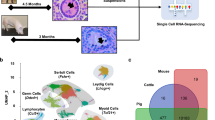Abstract
Testis-specific genes are essential for the spermatogenesis in mammalian male reproduction. In this study, we have identified a novel testis-specific gene, Ccdc136 (coiled-coil domain containing 136), from the results of high-throughput gene expression profiling in the developmental stage of mouse testes. Ccdc136 was conserved across species in evolution. Quantitative real-time polymerase chain reaction and Western blot analyses showed that Ccdc136 messenger RNA and protein were extraordinarily expressed in mouse testes, which was first presented at postnatal 3 week and increased in an age-dependent manner before adulthood. Immunofluorescence staining revealed that CCDC136 protein was most abundantly located in the acrosome of round spermatids and elongating spermatids within seminiferous tubules of the adult mouse testes. To investigate the function of Ccdc136 in mouse testes, we generated the Ccdc136-knockout mice using Cas9/RNA-mediated gene targeting technology. Interestingly, we found Ccdc136–/– males were infertile, due to severe defect of disrupting acrosome formation. The expression levels of proteins (SPACA1 and PICK1) involved in acrosome formation were significantly downregulated in the testes of Ccdc136–/– mice than wide-type mice. Moreover, in vitro fertilization assay revealed that anti-CCDC136 antibody could remarkably inhibit fertilization, suggesting CCDC136 also plays an important role in fertilization. All of these demonstrated the essential role of CCDC136-mediated acrosome formation in spermatogenesis and fertilization, which might also provide new insight into the genetic causes of human infertility.
Similar content being viewed by others
References
De Kretser, DM, Baker, HW Infertility in men: recent advances and continuing controversies. J Clin Endocrinol Metab. 1999; 84(10):3443–3450.
Nishimune, Y, Tanaka, H Infertility caused by polymorphisms or mutations in spermatogenesis-specific genes. J Androl. 2006; 27(3):326–334.
Shen, C, Kuang, Y, Liu, J, et al. Prss37 is required for male fertility in the mouse. Biol Reprod. 2013;88(5):123.
Hamamah, S, Anahory, T, Ferriere, A, Loup, V, Reyftmann, L, Dechaud, H Therapeutic solutions for male infertility [in French]. J Gynecol Obstet Biol Reprod (Paris). 2009;38(spec no 1-2): F58–F64.
Berndtson, WE Methods for quantifying mammalian spermato-genesis: a review. J Anim Sci. 1977;44(5):818–833.
Li, RK, Tan, JL, Chen, LT, et al. Iqcg is essential for sperm flagel-lum formation in mice. PLoS One. 2014;9(5):e98053.
Liu, F, Jin, S, Li, N, Liu, X, Wang, H, Li, J Comparative and func-tional analysis of testis-specific genes. Biol Pharm Bull. 2011; 34(1):28–35.
Tang, A, Yu, Z, Gui, Y, Zhu, H, Long, Y, Cai, Z Identification of a novel testis-specific gene in mice and its potential roles in sper-matogenesis. Croat Med J 2007;48(1):43–50.
Xing, XW, Li, LY, Liu, G, Lu, GX Cloning of cDNA of SRG4, a mouse spermatogenesis related gene and expression in mouse different developing stages [in Chinese]. Yi Chuan Xue Bao. 2004;31(10):1066–1071.
Xing, XW, Li, LY, Liu, G, Fu, JJ, Tan, XJ, Lu, GX Identification of a novel gene SRG4 expressed at specific stages of mouse sperma-togenesis. Acta Biochim Biophys Sin (Shanghai). 2004;36(5): 351–359.
Matsuoka, Y, Iguchi, N, Kitamura, K, et al. Cloning and character-ization of a mouse spergen-1 localized in sperm mitochondria. Int J Androl. 2004;27(3):152–160.
Hao, Z, Wolkowicz, MJ, Shetty, J, et al. SAMP32, a testis-specific, isoantigenic sperm acrosomal membrane-associated protein. Biol Reprod. 2002;66(3):735–744.
Dong, WW, Huang, HL, Yang, W, et al. Testis-specific Fank1 gene in knockdown mice produces oligospermia via apoptosis. Asian J Androl. 2014;16(1):124–130.
Modarressi, MH, Cameron, J, Taylor, KE, Wolfe, J Identification and characterisation of a novel gene, TSGA10, expressed in testis. Gene. 2001;262(1-2):249–255.
Yang, S, Wang, W, Lei, C, et al. Localization and characterization of rat transmembrane protein 225 specifically expressed in testis. DNA Cell Biol. 2011;30(1):9–16.
Chen, H, Yi, M, Sheng, Y, Cheng, H, Zhou, R A novel testis-enriched gene Spata33 is expressed during spermatogenesis. PLoS One. 2013;8(7):e67882.
Xiao, P, Tang, A, Yu, Z, Gui, Y, Cai, Z Gene expression profile of 2058 spermatogenesis-related genes in mice. Biol Pharm Bull. 2008;31(2):201–206.
Chen, T, Jiang, Z, Xu, W, et al. Expression and identification of a novel gene Spata34 in mouse spermatogenic cells. Mol Biol Rep. 2014;41(3):1683–1691.
Schmittgen, TD, Livak, KJ Analyzing real-time PCR data by the comparative C(T) method. Nat Protoc. 2008;3(6):1101–1108.
Yao, R, Ito, C, Natsume, Y, et al. Lack of acrosome formation in mice lacking a Golgi protein, GOPC. Proc Natl Acad Sci U S A 2002;99(17):11211–11216.
Xiao, N, Kam, C, Shen, C, et al. PICK1 deficiency causes male infertility in mice by disrupting acrosome formation. J Clin Invest. 2009;119(4):802–812.
Fujihara, Y, Satouh, Y, Inoue, N, Isotani, A, Ikawa, M, Okabe, M SPACA1-deficient male mice are infertile with abnormally shaped sperm heads reminiscent of globozoospermia. Development. 2012;139(19):3583–3589.
Liu, F, Wang, H, Li, J An integrated bioinformatics analysis of mouse testis protein profiles with new understanding. BMB Rep. 2011;44(5):347–351.
Li, W, Wu, J, Kim, SY, et al. Chd5 orchestrates chromatin remo-delling during sperm development. Nat Commun. 2014;5:3812.
Krausz, C, Giachini, C Genetic risk factors in male infertility. Arch Androl. 2007;53(3):125–133.
O’Flynn O’Brien, KL, Varghese, AC, Agarwal, A The genetic causes of male factor infertility: a review. Fertil Steril. 2010; 93(1):1–12.
Hao, J, Chen, M, Ji, S, et al. Equatorin is not essential for acrosome biogenesis but is required for the acrosome reaction. Biochem Biophys Res Commun. 2014;444(4):537–542.
Hu, XQ, Ji, SY, Li, YC, et al. Acrosome formation-associated factor is involved in fertilization. Fertil Steril. 2010;93(5):1482–1492.
Souza, HV, Itoyama, MM Study of acrosome formation, interspe-cific and intraspecific, in the testicular lobes of some pentatomid species. J Insect Sci. 2010;10:132.
Fang, P, Xu, W, Li, D, et al. A novel acrosomal protein, IQCF1, involved in sperm capacitation and the acrosome reaction. Andrology. 2015;3(2):332–344.
Author information
Authors and Affiliations
Corresponding author
Rights and permissions
About this article
Cite this article
Geng, Q., Ni, L., Ouyang, B. et al. A Novel Testis-Specific Gene, Ccdc136, Is Required for Acrosome Formation and Fertilization in Mice. Reprod. Sci. 23, 1387–1396 (2016). https://doi.org/10.1177/1933719116641762
Published:
Issue Date:
DOI: https://doi.org/10.1177/1933719116641762




